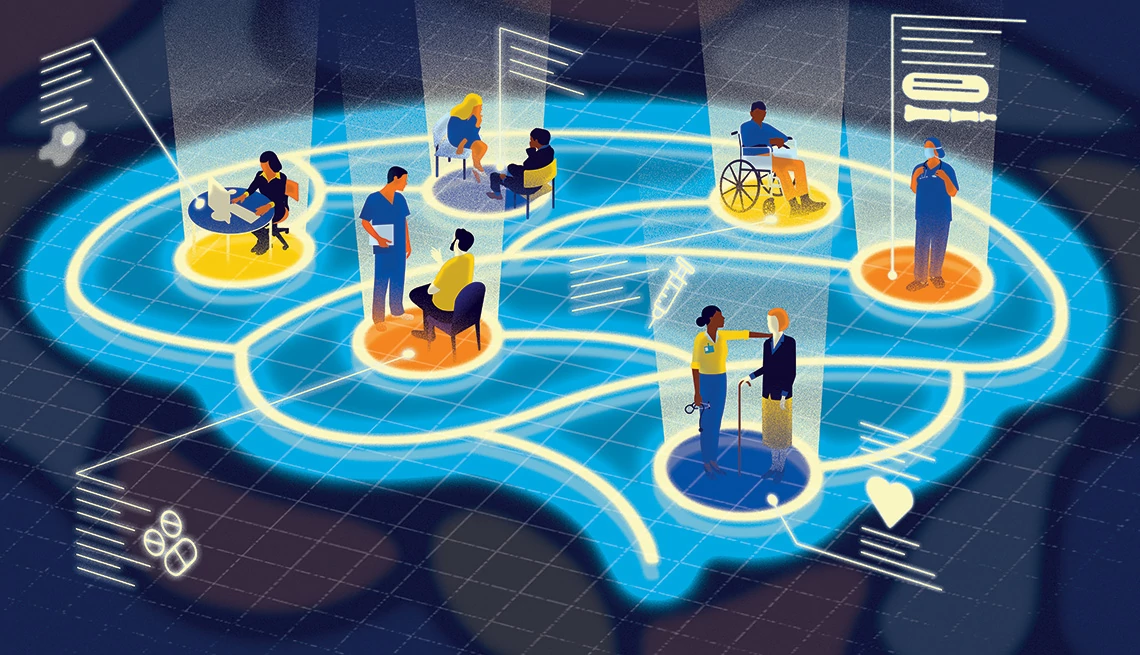
Can artificial intelligence solve caregiving’s crisis?
- Select a language for the TTS:
- UK English Female
- UK English Male
- US English Female
- US English Male
- Australian Female
- Australian Male
- Language selected: (auto detect) - EN
Play all audios:

Wes Donohoe, chief executive and cofounder of a start-up called Helpful that integrates medical and insurance records and caregiving guides, says his company has begun releasing features
from a generative AI model that will let someone ask open-ended questions along the lines of “My dad had a heart attack and bypass surgery. What do I do next?” Helpful will structure a
personalized plan after having the AI pore through benefit options, doctor’s instructions and other information, he says. AI CAN MANAGE A CAREGIVING SOCIAL NETWORK The idea behind many of
these efforts is to personalize care. Just as everyone has a different set of apps on their phones, the AI services available to a caregiver would also differ, Moss of Care Daily says.
People can communicate with the AI caregivers at companies Care Daily partners with by phone, in text messages or through the TV, Moss says. But whenever possible he advises that AI
caregiving be a family affair. “Family members who are being thrust into this caregiving role didn’t sign up for this, and they don’t know what to do. Part of the responsibility for an AI
caregiver is to help educate the family about how to play this role,” he says. Thus, the AI might arrange who needs to check in with Grandma on which day, whether that’s by phone, by
sharing a picture or in person. Moss also envisions AI caregiving as the “fabric for a new social network,” not something like Facebook, Instagram or TikTok, but rather one that brings
families together privately for the sole purpose of providing care for someone. Of course, not everyone has a trusted circle of relatives or community of friends who can help. That’s when a
primary caregiver would need to summon outside care coordinators and clinicians. AI AVATARS MAY BE MORE EMPATHETIC THAN HUMANS In some instances, AI is helping chatbots and other tools
become more empathetic, Orlov says. By asking a series of questions, a bot may be able to gauge how a person being cared for is feeling. Tone seems to matter. Victor Wang, founder and chief
executive of Care.coach in Millbrae, California, says generative AI improves the user experience for adults who engage with an empathetic chat-based virtual avatar that the company has
introduced. Responses from the AI avatar, called Fara, may differ from what you would hear from a medical provider, often for the better. Tell your doctor you have a rash, Wang says, and he
may say something like “Uh, just put some hydrocortisone on it, three times a day. Let me know if it’s still a problem within a week.” The AI, which is not a doctor, might give similar
advice delivered in a friendlier fashion: “ ‘Oh, I’m so sorry to hear that. I would be really concerned as well if I had that kind of rash.’ You read it and you’d be like, ‘Wow, what a
thoughtful doctor,’ ” Wang says. Other potential advantages: AI responses come faster than a human at the other end can type. And the AI has a superior memory. AI CAN’T BE RELIED ON ALONE
Wellthy, a New York City company that matches care coordinators with people who may be chronically ill, disabled or merely aging, is using generative AI to cut down on jargon and improve the
tone of messages sent to members, says Kevin Roche, a cofounder and chief technology officer. But Roche is mindful of one of AI’s current flaws: hallucinations or answers that AIs spit out
that sound plausible but are wrong or made up. “We’re not having a chatbot where a member is just talking to an AI,” Roche says. “That’s too risky at this stage for high-stakes situations
like caregiving. We want to make sure that everyone understands that you can’t take what [an AI] comes back with at face value. It always requires human review. … And it’ll be our stance
that it should always be clear whether this is a message coming from a system or a human.” _ This story, originally published Jan. 8, 2024, has been updated to include the release of some
new AI caregiving features._
